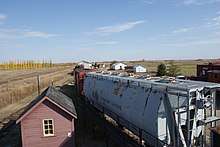Canpotex
Canpotex, short for Canadian Potash Exporters (reporting mark PTEX), is a Canadian potash exporting and marketing firm, incorporated in 1970 and operating since 1972.[1] Based in Saskatchewan, Canpotex manages the entire Saskatchewan potash exporting industry (excluding Canadian and US sales), including transportation and delivery.[2]
 | |
| Private | |
| Industry | Exporting and marketing |
| Founded | 1970 |
| Headquarters | Saskatoon, Saskatchewan , |
Area served | Worldwide |
Key people | Ken A. Seitz President and Chief Executive Officer |
| Products | Potash |
| Owner | The Mosaic Company, and Nutrien |
Number of employees | 125 (2017) |
| Website | www.canpotex.com |
| Footnotes / references [1] | |
Canpotex is the world's largest exporter of potash, selling over 10 million tonnes of potash every year,[2] representing about one-third of global capacity.[3][4] The global potash market was considered a duopoly between Canpotex and Belarusian Potash Company (BPC), a similar consortium which exported Belarusian (Belaruskali) and Russian potash (Uralkali); until the BPC marketing venture failed in 2013, the two collectively controlled 70% of global potash exports.[5]
Member producers
Facilities

Canpotex operates over 5,500 specialised covered hopper cars for inland transportation of potash from landlocked Saskatchewan to ports,[6] and operates solely on Canadian Pacific Railway lines.[7] In 2011, Canpotex started on the construction of a new $55 million rail car maintenance yard near the town of Lanigan, Saskatchewan used to perform maintenance and manage the inventory of railcars.[8]
The majority of its potash is shipped overseas to Asian, Latin American, and Oceanic markets[9] through Neptune Terminals, partly owned by Canpotex, in North Vancouver, British Columbia.[10] Since 1997, Canpotex has additionally exported through Portland Terminals (owned by Canpotex and operated by Kinder Morgan) in Portland, Oregon.[10] Canpotex additionally ships smaller quantities of potash through the St. Lawrence Seaway via Thunder Bay, Ontario, and has access to ports on the East Coast of the United States and Gulf of Mexico.[11]
Ships
Canpotex has committed $900 million to the manufacture of 15 cargo vessels. The first of these vessels, the U-Sea Saskatchewan, built as a joint venture with Ultrabulk received its first load of 58,000 metric tons of potash in the Port of Vancouver in November 2010.[12] The U-Sea Saskatchewan was built by Imabari Shipbuilding of Japan and is capable of carrying 60,000 metric tons.[13] Other ships include the Ultra Colonsay.
References
- "Canpotex Limited - Complete Profile". Industry Canada. 2017-03-16. Retrieved 2018-02-14.
- "Our Potash Markets". Canpotex. Retrieved 2018-02-14.
- Ogg, John C. (2008-04-16). "Canpotex Owners Surge On Potash Price Hikes For China". MarketWatch. Retrieved 2009-09-09.
- Buow, Brenda (2010-08-24). "Canpotex fate spurs closer look at Potash Corp. takeover". The Globe and Mail. Retrieved 2010-09-07.
- Regan, James; Zheng, Tracy (2010-08-24). "Analysis: Possible change in potash pricing worries China". Reuters. Retrieved 2010-09-08.
- "Inland Transportation". Canpotex. Archived from the original on 2010-08-23. Retrieved 2010-09-07.
- "Canpotex Submission to the Canadian Transportation Agency with respect to the Review of the Railway Interswitching Regulations". Canpotex. 2010-06-10. Archived from the original on 2011-07-21. Retrieved 2010-09-07.
- "Canpotex to build repair facility in Saskatchewan for rail cars carrying potash". Global Saskatoon. 2011-04-19. Retrieved 2011-04-19.
- "The Market". Canpotex. Archived from the original on 2011-06-20. Retrieved 2010-09-08.
- "Terminal Operations". Canpotex. Archived from the original on 2010-08-23. Retrieved 2010-09-07.
- "Handling & Delivery". Canpotex. Archived from the original on 2010-08-23. Retrieved 2010-09-07.
- Press Release November, 19, 2010
- "Arrival in Port of Vancouver". Archived from the original on 2011-10-09. Retrieved 2010-12-19.